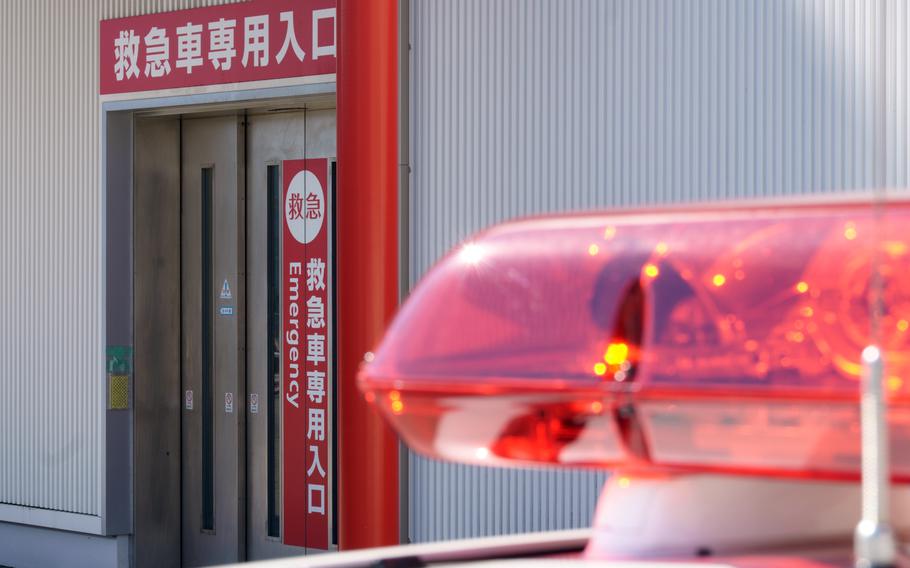
U.S. personnel are “routinely denied access to emergency care” in Japan, with at least 24 people turned away from Japanese hospitals between January 2022 and February 2023, according to a Navy and Marine Corps investigation. (Akifumi Ishikawa/Stars and Stripes)
A 7-year-old girl, the daughter of a Marine based on Okinawa, was with her family at a mall in Urasoe City on Jan. 21 last year when she lost her balance by an escalator and fell nearly three stories.
People who rushed to her side reported she was “aware, with eyes open and saying Mommy,” despite her traumatic brain injury. A Japanese bystander called for help; she stayed with the family. Within minutes, an ambulance arrived.
But then a distressing situation became even worse. The medical team in the ambulance contacted two local hospitals — and were turned away. One said they had “just received another emergency,” the other said the injuries were “beyond their capabilities.” A call to Naval Hospital Okinawa went to an unstaffed human resources line; they had the wrong number for emergencies. The doctor in the ambulance tried to intubate the child three times — unsuccessfully.
Finally a call to a U.S. 911 operator led the ambulance to the naval hospital. Thirty-five minutes had elapsed. That delay “removed any opportunity of a meaningful recovery,” an expert said. Three weeks later, the child died.
Shocking isn’t it, that the emergency rooms of two Japanese hospitals would refuse to treat an injured child. Equally shocking? Such refusals are routine.
At least 24 U.S. military or their families or Defense Department civilians were denied care at Japanese hospitals between January 2022 and February 2023, an investigation by the Navy and Marine Corps determined.
All of this was described in a Feb. 14 story in Stars and Stripes by reporter Alex Wilson, an Asia-Pacific correspondent for Stripes. (The tragedy also was described in a story by Patricia Kime in military.com last month.) Wilson, a journalist with six years of experience, covers the U.S. Navy and other beats for Stripes from the Yokosuka Naval Base in Japan. He did a fine job distilling the 98-page report, which I read.
People who have not been journalists may think it’s an easy job — the authorities give you a report, you read it, write a story. Done. Simple? Not so.
Officials with the Marine Corps Installation Pacific, who conducted the investigation shortly after the accident, did not release the report, Pacific Bureau Chief Aaron Kidd, Wilson’s editor, told me when I asked.
Wilson obtained the report from a group of DOD civilians in Japan who have been advocating for better health care access, Kidd said.
Such connections to the community are crucial, and a reason it’s important to have Stripes’ personnel positioned around the world where military members are serving.
It’s also important to have reporters and editors who take the time to understand the issues. Emergency health care access in Japan is a complicated situation.
The refusal by the two hospitals’ emergency rooms to care for the 7-year-old was not based on intentional discrimination, according to the report.
Hospitals there also turn away Japanese citizens as a matter of course. In the U.S., any patient who arrives at an emergency room is guaranteed care, but no such law exists in Japan.
“In December 2022, Japanese ambulances were denied hospital admission 8,000 times and in January 2023 their citizens were denied 16,000 times,” the report stated, quoting someone whose name was redacted.
This points to systemic problems, not single instances of mistakes. For example, look back to 2021 when a civilian employee with the U.S. forces was denied care at 10 Japanese hospitals and died of a heart attack before receiving treatment at the 11th.
The report makes recommendations to improve health care access — such as establishing a new 911 system with geolocation capabilities similar to the U.S. — and forming a working group to explore more options.
The story is not over.
I am confident that Stripes’ journalists will continue to stay on top of this issue and press for details on the progress of the recommendations. The military should be forthcoming with information of such life-or-death matters. Stripes’ staff also will monitor the broader health care concerns of civilian defense employees, heightened as a consequence of a congressional mandate last year that ordered priority on-base care to active-duty service members and their families.
Careful attention to such issues, and following through, is the quality of coverage Stripes’ readers can expect.
Email Jacqueline Smith at smith.jacqueline@stripes.com or ombudsman@stripes.com.